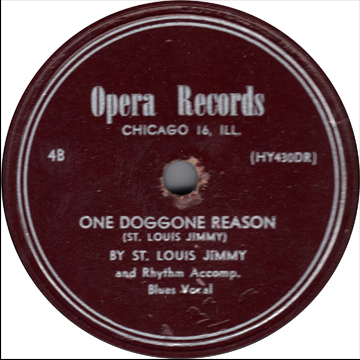

Revision note. We have updated our coverage on Opera 4, by St. Louis Jimmy, which we have long thought was originally recorded for Hy-Tone. It was cut at the same session, around October 18, 1947, as Hy-Tone 36 by Jack Cooley. We have updated our coverage of Opera 3, by Byllye Williams. Finally, we can offer photos of all five releases on the label.
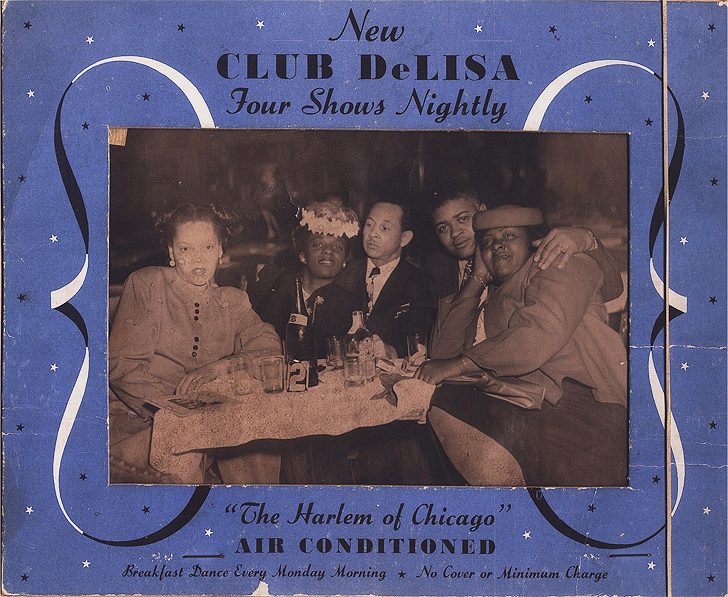
Opera Records was one of the smaller Chicago independents. It ran for a brief time, probably just a year (from the fall of 1947 to the fall of 1948). The label was the first effort by the indefatigable Joe Brown, who in later years came out with a considerably more successful JOB operation. (We are talking in relative terms here, as JOB was still a mom and pop outfit.) Opera probably had the same co-founders as JOB, Brown and James Burke Oden (bluesman St. Louis Jimmy). The fledgling company may have operated out of the same Southside residence, 4008 South Ellis Avenue, which was reported in 1954 for Brown's JOB label. With his Opera enterprise, Brown recorded a mixture of artists—club pianists, jazz combos, and deep bluesmen. His later JOB label would concentrate on Southern-style bar-band blues artists.
Joe Brown was born in Wagoner, Oklahoma, of African-American and Cherokee Indian parentage. His date of birth was June 16, 1904, according to Jim O'Neal. Joe Brown's son Mike (in a telephone conversation on March 27, 2009) has confirmed that the 1904 date is correct, not the 1897 date given by other writers, including Mike Rowe. Joe Brown was the second of three children, with an older sister born in 1901 and a younger brother born in 1914. We do not know when Joe Brown first came to Chicago. Brown was already in his mid-40s and had probably been settled in Chicago for some time when began his career in the recording business. Neither Rowe, in his classic book Chicago Breakdown, nor O'Neal in his obit in Living Blues, give much in the way of biographical information. According to his son Mike (conversation of May 8, 2009), Joe Brown was a boxer for a time during his youth; he also invested in two gas stations (one of them was located on 55th Street) that were operated by his brother Lawrence. He was almost certainly involved in a number of other business ventures.
Opera labels show no publisher (Opera 5, by "Delta Joe," cites no composers either). Obviously, like the proprietors of Aristocrat and Chess in the early years, Brown did not appreciate the value of music publishing. Later he would partner with Vincent "Bud" Brandom to form Lawn Music Publishers.
We have been able to trace five releases on Opera: two by Byllye Williams, and one each by St. Louis Jimmy, Sunnyland Slim (working under the name Delta Joe), and King Kolax and His Combo. Opera, like innumerable small operations, was what we call an "A and B" label: except with the St. Louis Jimmy record, the matrix numbers were merely the release number with an attached A or B depending on which side the owner wanted to plug. Consequently, we have no clue as to the recording studio Brown used. In 1947 and 1948, he would have had the same basic choices as other small-label proprietors in Chicago: Egmont Sonderling's United Broadcasting Studios or Bill Putnam's Universal Recording. The appearance of an MR monogram (for Sonderling's house record label, Master) on pressings of Opera 3 supports the United Broadcasting hypothesis.
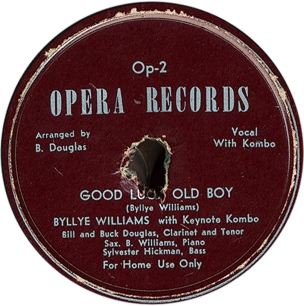
Byllye Williams (voc, p) with Ray "Bill" Douglas (cl -1, as); Roy "Buck" Douglas (ts); Sylvester Hickman (b); unidentified (d).
Chicago, prob. late 1947
| OP1 | Disgusted Woman Blues (Williams) -1 | Opera Op-1, Savoy 5554 | |
| CP-100-2 | Disgusted Blues (Williams)^ | Acorn 310-B^ | |
| OP2 | Good Luck Old Boy (Williams) -1 | Opera Op-2, Savoy 5554 | |
| CP-101 | Hep Hep Blues | unissued | |
| CP-102-2 | Hard Hearted Man (Williams)^ | Acorn 310-A^ | |
| CP-103 | Anything That's Part of You | unissued |
Byllye Williams, the daughter of a minister, was born Byllye Elizabeth Blassengame in Dowagiac, Michigan, on April 13, 1922. Her family had moved to the small rural town from Chicago and returned to the city probably in the late 1920s. She joined Local 208 of the Musicians Union in Chicago on November 4, 1940. At the time, she gave her name as Byllye B. Williams (which could be a stage name).
Williams first attracted notice in the spring of 1941 performing at Fay's Rose Bowl (655 East 43rd—she was described as "famous blues singer") and then at the Piccadilly Inn (3652 Indiana—she was billed as "sensational torch singer" and "one of the city's leading vocalists"). On February 19, 1942, her contract with Tin Pan Alley, a Loop establishment, was accepted and filed by Musicians Union Local 208. She was back at Tin Pan Alley for an "indefinite" engagement starting in September (contracted accepted and filed on the 17th). Later that fall she was performing nightly at Don's Den (528 East 43rd St), owned by former football star, Don Simmons (her contract with Simmons was posted on November 5). The Defender ran her picture and in the caption described Williams as "one of the city's finest pianists and song stylists." During much of 1943 she played at the Piccadilly Inn and Don's Den. She also appeared at the Sunny Side Club (contract accepted and filed August 19, 1943); however, she was back at Don's Den in October (contract posted on October 21). On June 1, 1944, she posted a 1-week contract at the Show Tap; on July 20, she posted a contract for 8 weeks at Millie's Cocktail Lounge; her contract was extended on August 3 and again October 19. On November 16, she posted a 4-week contract at the Flame Lounge (3020 Indiana). Thereafter, until her sessions for Opera, she performed at such nighteries as The Flame, the Casablanca Lounge (3901 South Parkway), Cafe de Society, and the 708 Club (708 East 47th).
She was at the height of her visibility in 1948, when Opera released these sides on her. Blues Records 1943-1970, Volume Two, compiled by Mike Leadbitter, Leslie Fancourt, and Paul Pelletier (LFP), lists a recording date of October 15, 1948, but this was when Savoy mastered sides from the session for release.
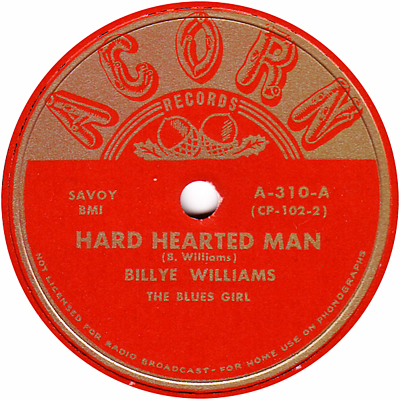
Billboard on November 6, 1948, reported that Savoy had purchased six "race" masters from Opera. Acorn was a subsidiary of Savoy, set up with disguised ownership in order to put out releases (like those of John Lee Hooker under various pseudonyms) that might prompt legal action. On the Savoy and Acorn labels Byllye became "Billye." On Acorn she was billed as "Billye Williams - The Blues Girl." The Acorn release of "Disgusted Blues" used a different take from the original Opera release. It is a hair faster, timing in at 3:11 instead of 3:26; Byllye plays a piano introduction not included in the original; and Bill Douglas plays alto sax instead of clarinet. On the Acorn take, Byllye sings "I want a great big 45 / To blow out your dirty brains — 'Cause you ain't no good" twice; on the Opera take the line appears only at the end of the piece.
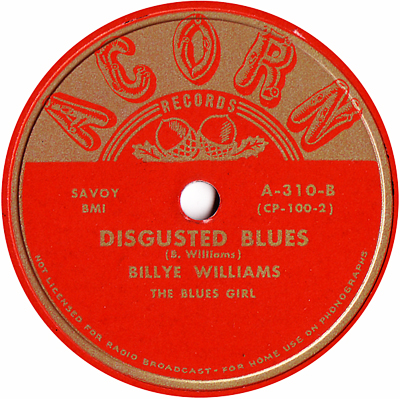
Furthermore, the March 6, 1948 Chicago Defender carried an advertisement for the Four Star Lounge (224 East 61st Street) that featured Byllye Williams, identifying her as the "Recording Artist of 'Disgusted Woman Blues'." In other words, she had recorded the song by this date; the mention does not constitute proof that Opera Op-1/2 had been released. More importantly, it tells us that these recordings were almost certainly done in late 1947, before the Musicians Union recording ban went into effect on January 1, 1948.
Another Opera 2 label scan (from a copy without center hole damage) can be seen on Mike Kredinac's Web site, Mike's Pix. Though we have a photo of the Op-1 side in our archives, the label damage is too extensive to warrant displaying it here. We can confirm that the original title was "Disgusted Woman Blues" (the take released on Acorn was called "Disgusted Blues"). The session listings are derived from LFP; however, they did not recognize that two different takes of "Disgusted" were issued. The labels to both sides of Opera Op-1/2 helpfually attribute the arrangements to "B. Douglas"; was that Bill, or Buck?.
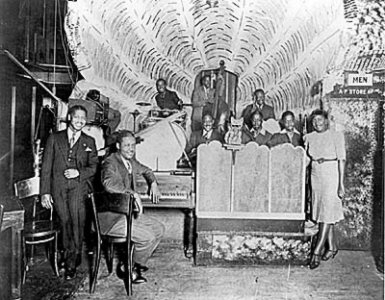
Ray "Bill" and Roy "Buck" Douglas look like brothers in the two photos we have seen of them (in 1945 or 1946, they were members of a Bill Martin band, as can be seen on our Hy-Tone page). Their names suggest they were identical twins, though this needs to be confirmed. They were based in Kansas City before coming to Chicago; a 1939 photo, taken at Club Reno in KC, shows both Douglas brothers on the bandstand with three other KC-based musicians who migrated to Chicago during World War II: Bill Searcy, Lowell Pointer, and Bill Martin. Searcy and Pointer would work for a time with Tom Archia; Bill Martin enjoyed several years of steady employment as a bandleader, turning out four singles for Hy-Tone and later recording for the Decca subsidiary Coral.
Buck, a tenor saxophonist in the Coleman Hawkins tradition, had acquired a little recording experience before Opera started up. He had cut for Hy-Tone on Bill Martin's two sessions in May and September 1946, and for RCA Victor in a New Orleans-style band led by trombonist Preston Jackson (October 31, 1946). In September 1948 or February 1949, he would cut four sides for the Square Deal label, a tiny enterprise of which he was part-owner (see Appendix A).
Local 208's contract lists show Bill Douglas as the bandleader in the clubs during this period. So far as we know, this session was marked the first appearance on record for Bill's reedy Swing-era clarinet.
Byllye Williams (voc, p) with Adam Lambert (eg); Sylvester Hickman (b).
United Broadcasting Studio, Chicago, prob. late 1947
| OP-3-A | The New Bleeding Hearted Blues (Williams) | Opera 3a | |
| OP-3-B | Daddy Please Do (Williams) | Opera 3b |
Like the previous release, this record was most likely recorded before the ban kicked in. Chris Bentley in Blues & Rhythm described "The New Bleeding Hearted Blues" as "passable small combo blues of the sort cut by Mayo Williams immediately post WW II," and dismissed "Daddy Please Do" as a song in the Billie Holiday vein. (Now that we've heard it, we can agree with Bentley about the Billie Holiday influence without sharing his dismissiveness.)
LFP presumably got the personnel off the labels to this rare 78. The copy now in our archives was formerly in the collection of Bill Sabis. It has an MR logo in the trail-off shellac adjacent to the label on each side, indicating Master Records. Also, the gain is rather crudely raised for the piano solo on "Daddy Please." The same procedure can be noted on Opera 6, which also sports the MR; one doesn't hear such things on sides cut at Universal during the period.
Byllye Williams subsequently recorded for another small Chicago label, Theron. Her first session, cut toward the end of 1950, produced a classic in "Hangover Blues." In October 1953, she sang on a session by Leon Washington's All Stars; by this time, she had adopted the name Byllye Jet Williams, which she used consisently thereafter. She worked steadily through March 1958, when she was sidelined by cancer. Byllye Williams died on November 4, 1958; she was 36 years old.
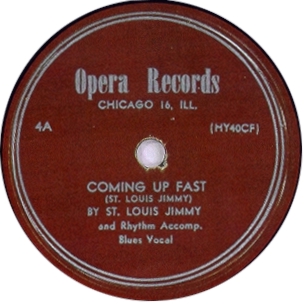
St. Louis Jimmy (voc) with Roosevelt Sykes (p); Lamont "Guitar Pete" Franklin (eg); poss. Alfred Elkins (b).
United Broadcasting Studio, Chicago, c. October 18, 1947
| HY40 CF | Coming Up Fast (St. Louis Jimmy) | Opera 4A | |
| HY43 ODR | One Doggone Reason (St. Louis Jimmy) | Opera 4B |
St. Louis Jimmy was born James Burke Oden on June 26, 1903, in Nashville, Tennessee. He moved to St. Louis in 1917, where he performed and picked up his name. Along with Roosevelt Sykes, he moved to Chicago in 1932. Oden recorded regularly during the 1930s and 1940s, scoring a big blues hit with "Going Down Slow" for Bluebird in 1941. Although he played piano himself, Oden never joined the Musicians Union. So his practice was to sing on his records and leave the keyboard chores to more proficient performers like Roosevelt Sykes. After World War II he also began appearing on sessions with Sunnyland Slim, who we had previously thought might be the pianist on St. Louis Jimmy's Opera release. According to John Newman, however, Roosevelt Sykes accompanied him on this occasion.
Our information about the matrix and release numbers is derived from a copy formerly in Tom Kelly's collection. LFP leave out the "O" (for "One") in HY43 ODR. The matrix numbers strongly suggest that these sides were recorded at the tail end of Freddie Williams and Nathan Rothner's Hy-Tone operation. We had estimated a December 1947 date for the session, but discovery (in 2018) of Hy-Tone 36 by Jack Cooley (with piano accompaniment we are now sure is by Roosevelt Sykes) shows HY40A in the trail-off area for Side A. Otherwise, the matrix numbers on the Cooley single are UB21813 (Side A) and UB21817 (Side B). So these two St. Louis Jimmy sides were part of a 5 or 6 side outing around October 18, 1947. For the two tracks by Jack Cooley with Roosevelt Sykes, see our Hy-Tone page.
On some of its releases Hy-Tone used the HY prefix and (planned) release number as (part of) the mastering number. Hy-Tone ceased recording at the end of December 1947, and, while it continued with a release schedule into 1948, the company was faltering and would become inactive in the fall of that year. Wanting to ensure that his sides were released, Oden probably purchased them and brought them in among his assets for the Opera label.
The guitarist plays with a slide on "One Doggone Reason"; St. Louis Jimmy can be heard addressing him as "Pete" during an instrumental break for the piano and the guitar on the same number. Newman identifies him as Lamont Franklin, aka Guitar Pete. The playing of the bassist is solid and unspectacular and I would guess that a likely candidate is Alfred Elkins
(John Newman, email of August 21, 2006). Franklin showed up on an October 1952 session for JOB that included John Brim, Ernest Cotton, and Sunyland Slim; perhaps Joe Brown remembered his work from this session.
St. Louis Jimmy recorded one subsequent session for Brown in 1949. This was for the brand new JOB label, and it gave rise to one release; the session was subsequently unloaded to Apollo. A second session, featuring a singer named Mildred Richards, used one of his tunes. He appears to have sold back his ownership share in JOB in 1950, because he did not record for that label again. Other labels that put out St. Louis Jimmy product from 1948-1949 recording sessions were Aristocrat, Mercury, Miracle, and Savoy.
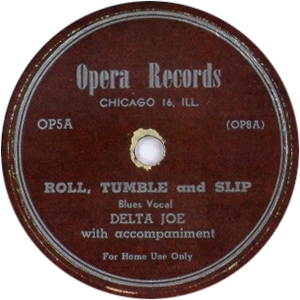
Delta Joe [Sunnyland Slim] (voc, p); Leroy Foster (eg).
Chicago, 1947 or 1948
| OP8A | Roll, Tumble, and Slip | Opera 5A, Chance 1115, Muskadine 1, Muskadine M 100, XTRA [Br] 1133, Classics 5013 [CD] | |
| OP8B | Train Time | Opera 5B, Chance 1115, Nighthawk LP 102, Classics 5013 [CD] |
Deep blues pianist and singer Sunnyland Slim must have recorded under the Delta Joe pseudonym out of a concern over breaching a contract. We just don't know which label the contract was with. The previous year he had cut two sessions for Aristocrat, two sessions for Hy-Tone, and two more for RCA Victor (which were under a different pseudonym, "Doctor Clayton's Buddy"). In May 1949, he would cut a celebrated session for Tempo-Tone.
Slim was born Albert Luandrew on September 5, 1906, in Vance, Mississippi. He moved to Chicago in the early 1940s, made an appearance as a vocalist on a Jump Jackson session for Specialty in September 1946, and followed with his first recordings as a leader in August or September 1947, for Hy-Tone and Aristocrat. By the time he made these sides for Joe Brown he could be found on the doorstep of every label in Chicago.
In 1952, the Delta Joe sides were picked up by Art Sheridan (who had periodic business dealings with Joe Brown) and released on his Chance label. On reissue, "Roll, Tumble, and Slip" was retitled "I Cried" and "Train Time" was retitled "4 O'Clock Blues."
Muskadine 1, Muskadine M 100, and XTRA 1133 were LPs released c. 1969, in 1971, and in 1973; all were titled On the Road Again: An Anthology of Chicago Blues 1947-1954. We don't know whether the Chance or the Opera release was dubbed, but the Opera titles were retained. Nighthawk LP 102, Chicago Slickers 1948-1953, was released in 1976; it may have relied on a dub of Chance 1115 but used the Opera titles. Classics 5013, Sunnyland Slim 1947-1948, is a French reissue compilation from 2001.
Our thanks to Tom Kelly for the correct matrix numbers; they have been listed as 5A and 5B in the past. Could be these sides were recorded later than the next two, by King Kolax, and the release series was subsequently shuffled—but we have no way to be sure.
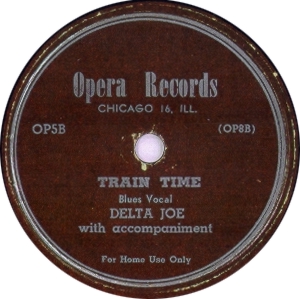
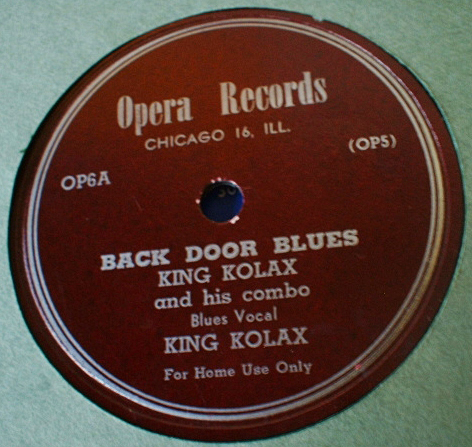
King Kolax (voc; tp-1); Johnny Thompson (ts); Willie Jones (p); unidentified (b); unidentified (d).
Chicago, before October 1948
| OP5 | Back Door Blues | Opera 6A | |
| OP6 | Straight Woman Blues | Opera 6B |
Although he had been in the band business since 1936, this is just the second session that King Kolax made under his own name (more correctly, under his performing name). He was born William Little in Kansas City, November 6, 1912, and grew up in Chicago. Through much of the 1940s Kolax-led big bands (after the middle of 1947, small combos) were touring nationwide and performing regularly in Chicago clubs. One of Kolax's 1939 bands included a saxophonist from Kansas City named Charlie Parker; John Coltrane sat in the saxophone section of Kolax's last big band, in the first half of 1947. Just when the Opera session was done is unclear. Kolax's last big band, his 17 Knights, recorded four incredibly obscure sides in Los Angeles for Miltone in February 1947, and fell apart in May 1947; he spent part of the fall of that year on the road with a package show. Most likely his Opera single was recorded—clandestinely, on account of the second Petrillo ban—in July 1948, or even later.
Thanks to collector Robert Javors for information on an item that's extraordinarily rare even by Opera standards. There are two known copies, which makes it as rare as King Kolax's Ace/Miltone releases. The single was previously known to have been issued, but no details could be found in the published sources. We surmise it was released just before Joe Brown decided to throw in the towel on the label. The Master Records monogram is visible in the trailoff area of both sides of Opera 6.
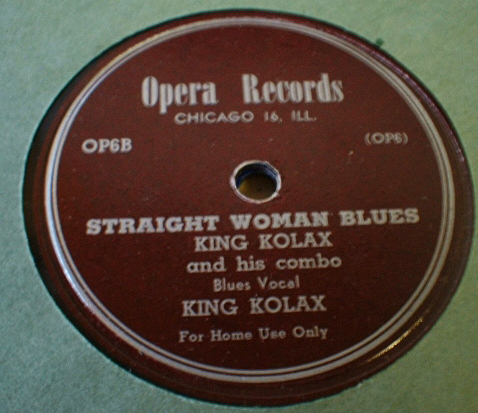
The tenor saxophonist is prominent on both sides (including solos). Drummer Vernel Fournier played in Kolax's last big band (1947) and in a Chicago-based combo with Kolax (1948-1949, beginning after this session). He told us that saxophonist sounded a bit like Joe Houston (who was the tenor soloist in Kolax's last big band), but concluded that the tenorist was Johnny Thompson. (Houston is not known to have spent much time in Chicago, or to have stayed with Kolax after the big band broke up. Thompson was a Chicago native.) The pianist, who is featured on "Straight Woman Blues," is a heavy blues player (also given to muttering during his solos); on hearing a dub of Robert Javors' copy, Vernel Fournier immediately identified him as the "piano wrecker," Willie Jones (1920 - 1977). Judging from these sides, King Kolax, who would handle the vocals on some of his later recordings, could have made it as a stand-up R&B singer.
Opera was Joe Brown's first foray into the record business. It was commercially unsuccessful. The extreme rarity of surviving Opera 78s indicates that both distribution and sales eluded him. In October 1948 he sold Savoy six masters, probably all Byllye Williams sides, then dropped out of the business to recoup and regroup. In fact, the item on the Savoy purchase, dated October 30, 1948 was the only mention Opera would ever get in Billboard ("Savoy, Regent in Catalog Buying Spree," November 6, 1948, p. 19)
In August 1949, Brown and Jimmy Burke Oden formed the JOB label, which reportedly was a transposition of his bluesman partner's initials: JBO. The new label would record not only Oden but also King Kolax (who was once again featured as a blues singer) and Sunnyland Slim (who appeared on many sessions in the early 1950s and, it was said, also had a piece of the firm during that period). Jimmy Oden bailed pretty quickly, after most of the label's first session, on which he was featured, was sold to Apollo and Regal. Brown, however, persevered, and after another couple of false starts in 1950 began recording and releasing material regularly from 1951 to 1954. Thereafter, the label would operate in fits and starts for two more decades. Joe Brown sold most of the JOB masters to Jewel in 1972 but did not shut down JOB entirely until 1974. We do not know whether Opera masters were included in the 1972 sale, but we have not encountered any in Jewel's reissue programs or their successors.
For the rest of the Joe Brown story, see our page on the JOB operation, and on Abco , which Brown ran with Eli Toscano for five or six months in 1956, Brown died in 1976, and St. Louis Jimmy died in 1977. King Kolax died in 1991 after many years of service as an official in the Musicians Union, and Sunnyland Slim, who remained active in music at an advanced age, died in 1995.
The main sources we used in compiling our profile of Opera included a Joe Brown obit written by Jim O'Neal for Living Blues 26 (March-April 1976); a profile on Joe Brown by Mike Rowe in Chicago Breakdown (London: Eddison Books, 1973); an obit on Joe Brown by Mike Rowe for Blues Unlimited 119 (May-June 1976); Robert Campbell's conversation with Mike Brown (March 27, 2009); the Opera listing compiled by Bob McGrath in The R&B Indies (West Vancouver, B.C.: Eyeball, 2000); and artist discographical information from Blues Records 1943-1970 (London: Record Information Series, 1987 and 1994).
Operas are elusive. We've finally gotten our mitts on an Opera 3 (which was in the collection of Bill Sabis), and we know of three copies of Opera 1/2, two of Opera 4, two of Opera 5, and two of Opera 6.
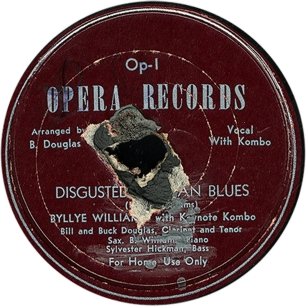
Opera is not a unique name for a record label. While Joe Brown's company was still in operation, another Opera started up in Houston, Texas. "Hits of the Hillbillies," which appeared on every label, suggested a different focus. Varioualy located in Houton and Los Angeles, the other Opera kept going through the end of 1950 and was responsible for around 20 releases.
Perhaps around the time Joe Brown decided to sell off his Byllye Williams masters and close Opera down, Buck Douglas recorded for a new label called Square Deal. Or perhaps it was a few months later. The formation of the label was announced on February 26, 1949, in the Chicago Defender column "What the Cats Do while the Squares Are Asleep." Square Deal was owned by Buck Douglas, Frank Lewis, and Jack Cooley. Of Buck's partners in the venture, Jack Cooley was well established on the South Side scene as a drummer, vocalist, and singing waiter; Lewis was a full-time businessman.
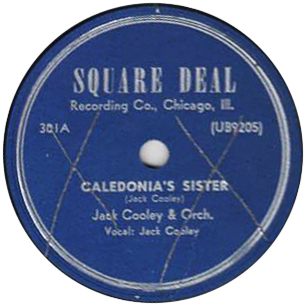
Supposedly the first release was going to be "Caldonia's [sic] Sister" b/w "Douglas Boogie." On March 5, the cats vs. squares column declared that Square Deal "has two new discs soon to be released," but just one coupling was identified by name—the same hybrid of Square Deal 301A and 302A that had been referred to on February 26. In the March 19 column, the two releases were said to be coming out "this week." The April 2 edition of the column claims three 78s for the company but the only new title mentioned is "I'm a Man," which was Square Deal 302B.
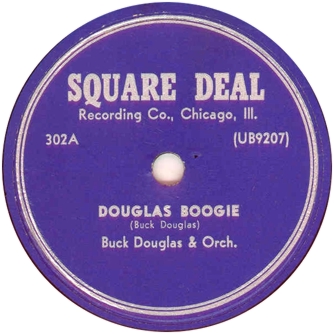
Roy "Buck" Douglas (ts); unidentified (p); unidentified (b); Jack Cooley (voc*, d).
United Broadcasting Studio, Chicago, prob. September 1948
| UB9205 | Caledonia's Sister (Cooley)* | Square Deal 301A | |
| UB9206 | What's So Fine about It (Cooley)* | Square Deal 301B | |
| UB9207 | Douglas Boogie (Douglas) | Square Deal 302A | |
| UB9208 | I'm a Man (Cooley)% | Square Deal 302B |
Our documentation for Square Deal 302 is derived from copies of the 78 in the collections of Dani Gugolz, Tom Kelly, Robert Javors, and Armin Büttner. An MR monogram is incised into the trailoff area on both sides of the 78. Although the single could not have had a long pressing run, there are two versions of the label: one with "Buck Douglas and Orch." and one with "Buck Douglas & Orch." The version with the ampersand seems more common.
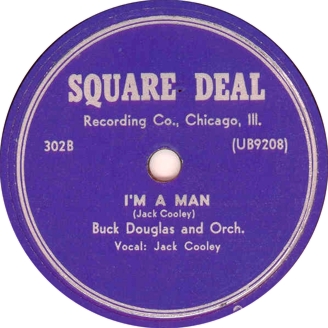
Square Deal 301, with Jack Cooley as the headliner, was also released in March 1949, and "Caledonia's Sister" was indeed one of the titles. Copes of this single, which for some reason is scarcer than 302, are in the collections of Mark Carlton and of the late George Paulus. We've seen labels with "Jack Cooley & Orch." and with "Jack Cooley's Combo"—possibly applied in different combinations.
The UB 9200 matrix numbers are most likely from September 1948, but we know that 4 sides by Doc Evans and Muggsy Spanier were recorded for Jazz Ltd. in February 1949 and given matrix numbers (9181 through 9184) that were out of sequence. So a date shortly before the February 26 announcement can't be ruled out.
In 1953, Frank Evans was featured in a Hamm's Beer ad in the Chicago Defender, one in a series that profiled local entrepreneurs. Some sources (such as Bob McGrath's two-volume edition of The R&B Indies) have dated the Square Deal releases to 1953 on the strength of this information. But if Square Deal was still running in 1953, it was no longer doing any active recording. We know of no other session on the label.
A little later, Buck Douglas would serve on Local 208's Examining Board (1950-1951). After that the brothers Douglas seem to have dropped off the Chicago scene; we don't know whether they returned to Kansas City or moved elswhere.
For more on Jack Cooley, who was a regular on the Chicago club scene between 1944 and 1960, recorded for Ebony, Mercury, and Apollo before Square Deal, and would run his own C&G label for a little while in 1950, see our Premium page.
Click here to return to Red Saunders Research Foundation page.